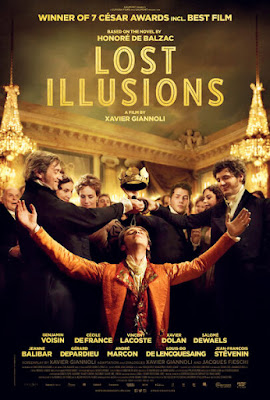At this point, we really shouldn’t accept newspaper reports as reliable primary sources. The Washington Post’s embarrassing controversies regarding stealth edits and misleading corrections are nothing new. Their imploding newsroom could totally relate to the poisoned-pen scribes at Le Corsaire-Satan. They traffic in gossip and sell their reviewers’ critical judgement to the highest bidder. The editor, Etienne Lousteau definitely shapes its stories to fit his preconceived “narratives,” until someone pays him to slant them differently. That is just fine with Lucien de Rubempre, until he finally believes he can attain the noble stature he believes is his birthright in Xavier Giannoli’s Balzac’s adaptation, Lost Illusions, which opens tomorrow in New York.
When people want to annoy de Rumpre, they call him Chardon, because that is technically his name and the name of his absent father, who ruined his blue-blooded mother. Like it or not, he is a commoner, so he should not be seen in compromising situations with Louise de Bargeton, the artistic patron for his poetry. Nevertheless, she brings him to Paris, risking a scandal that her older admirer, the Baron du Chatelet manages to suppress, at de Rumpre’s expense.
He was supposed to slink home to the provinces in disgrace. Instead, de Rumpre starts writing for Lousteau’s rabble-rousing anti-monarchist newspaper, quickly adapting to its advertorial ways. Yet, the corrupted poet cannot resist the temptation of vague promises to restore his family’s lost title.
While much of what transpires is tragic, the caustic characters and their unrestrained cynicism makes the film play more like a razor-sharp satire. Obviously, the portrayal of the media as deliberate misinformation peddlers could not be timelier. Given it was culled from Balzac’s The Human Comedy novel-cycle, Lost Illusions also clearly establishes the long-standing tradition mercenary journalistic ethics.
Oddly, Benjamin Voisin’s cold-fish portrayal of de Rumpre makes him the least interesting figure in the film. However, Xavier Dolan is great fun to watch scheming and generally “playing the game” as his mentor, Lousteau. Likewise, Andre Marcon and Louis-Do de Lencquesaing are entertainingly villainous as the Baron and Lousteau’s publisher. Plus, Jeanne Balibar’s acidic arrogance as salon doyenne Marquise D’Espard could match anyone in any adaptation of Dangerous Liaisons.
Lost Illusions is much more scandalously amusing than your typical costumed historical drama. Giannoli and co-screenwriter Jacques Fieschi convincingly re-establish Balzac’s hipness and cleverly lean into his humor. Highly recommended for Francophiles and armchair media analysts, Lost Illusions opens tomorrow (6/10) at Film Forum.

